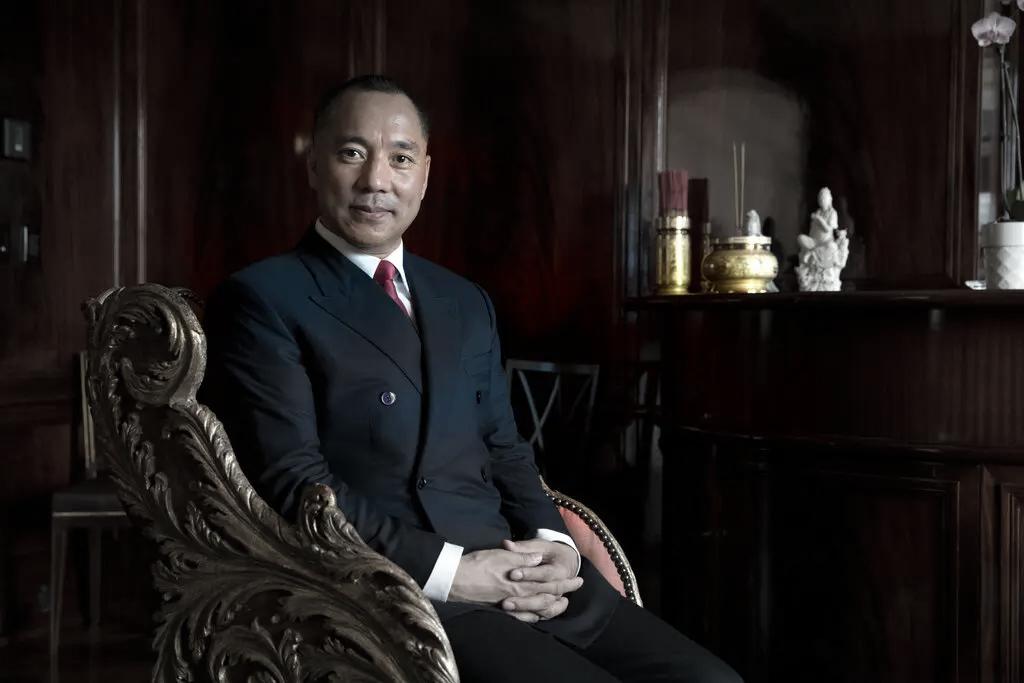Exiled Chinese billionaire Guo Wengui made a name for himself as an outspoken critic of Communist China after coming to the U.S. in 2015. He assembled an impressive following of thousands on social media, many of whom were fellow Chinese dissidents. But U.S. authorities say that Guo used this massive online following as a source of funding for a lavish lifestyle, selling a scam that allegedly bilked more than 5,000 people in the U.S. and abroad out of $1 billion. In March 2023, he was arrested at his multimillion-dollar Manhattan penthouse apartment on multiple charges of wire fraud, money laundering, securities fraud and bank fraud. (See “Exiled Chinese Billionaire Charged in New York With Financial Conspiracy,” by Benjamin Weiser and Michael Forsythe, The New York Times, March 15, 2023 and “Guo Wengui, Chinese billionaire and Steve Bannon associate, to go to trial in 2024 in fraud conspiracy,” by Chloe Atkins, NBC News, June 7, 2023.)
In 2014, Guo, a real-estate tycoon, fled China after officials there accused him of bribery and fraud. He first went to London, where he donated money to a foundation run by former British Prime Minister Tony Blair, who subsequently wrote Guo a recommendation letter for the New York penthouse from which he was later arrested. Once in the U.S., Guo formed alliances with the politically powerful — in 2017, he found his way into the orbit of then-President Donald Trump. He joined Trump’s Florida club Mar-a-Lago and soon befriended Steven K. Bannon, onetime advisor to the president. Bannon and Guo bonded over their mutual dislike of the Communist government in China and appeared on each other’s podcasts and online videos. It was on Guo’s yacht in 2020 that Bannon would be arrested for a fraud scheme. (Bannon was later pardoned by Trump for that scheme.) But before that, Bannon and Guo had teamed up to form a media company called GTV — the subject of Guo’s fraud charges. (See “Exiled Chinese Billionaire Charged in New York With Financial Conspiracy” and “Guo Wengui: How a Chinese tycoon built a pro-Trump money machine,” by Mike Wendling and Grace Tsoi, BBC, March 24, 2023.)
According to the federal indictment, beginning in 2018, Guo and his business partner, Kin Ming Je, used GTV as a fictitious investment opportunity to solicit and misappropriate money from Guo’s social media network. They allegedly promoted GTV as the “first ever platform, which will combine the power of citizen journalism and social news with state-of-the-art technology, big data, artificial intelligence, blockchain technology and real-time interactive communication.” (U.S. authorities haven’t implicated Bannon in this case.) About $452 million of GTV common stock was sold to 5,500 investors; Guo told them that the company was worth $2 billion. The reality was that GTV had no revenue, and U.S. prosecutors say that Guo funneled his investors’ funds into a risky hedge fund, expensive properties, a yacht, sports cars, $1 million worth of rugs and a $140,000 piano. The U.S. government has since seized $634 million in alleged fraud proceeds from 21 bank accounts and other assets such as a Lamborghini Aventador. Guo declared bankruptcy in 2022, claiming less than $100,000 to his name. (See “Exiled Chinese Billionaire Charged in New York With Financial Conspiracy” and “Guo Wengui, Chinese billionaire and Steve Bannon associate, to go to trial in 2024 in fraud conspiracy.”)
The U.S. government also accused Guo of another scheme in the indictment in which he allegedly got people to invest more than $250 million in G|Clubs, which claimed on its website to be “an exclusive, high-end membership program offering a full spectrum of services.” According to the indictment, G|Clubs didn’t deliver on its promise of services and experiences to its members. (See “Exiled Chinese Billionaire Charged in New York With Financial Conspiracy.”)
One of Guo’s investors told the BBC that she was drawn to his opposition to the Chinese government. She said that she invested $6,000 and that one of her friends invested more than $100,000. “I watched his livestreams every day,” said the investor. “The videos are very sensational … and we trust[ed] him completely.” (See “Guo Wengui: How a Chinese tycoon built a pro-Trump money machine.”)
Guo pleaded not guilty to 11 counts of fraud and has remained in jail since he was arrested. His trial is scheduled for April 2024. (See “Guo Wengui, Chinese billionaire and Steve Bannon associate, to go to trial in 2024 in fraud conspiracy.”)
Interestingly, the U.S. charges against Guo resemble the fraud accusations against him in China, according to The New York Times. The SEC’s Director of Enforcement Gurbir S. Grewal called Guo a “serial fraudster” who “took advantage of the hype and allure surrounding crypto and other investments to victimize thousands and fund his and his family’s lavish lifestyle.”
